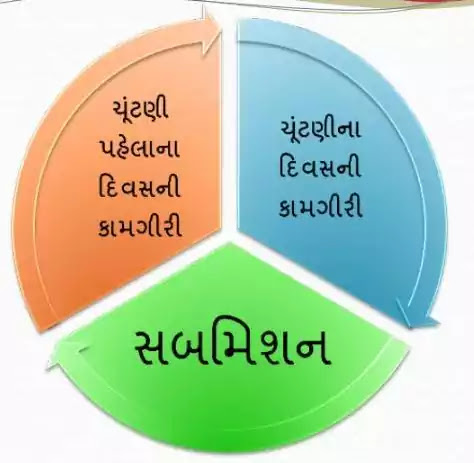ELECTION SHORT CUT KEY AND TAKAVARI EXCEL FILE
Introduction:
Election operations stand as the cornerstone of democratic societies, representing the collective voice and will of the people. In essence, they serve as the mechanism through which citizens participate in governance, entrusting their future into the hands of chosen representatives. However, the significance of election operations transcends mere symbolism; it encapsulates the essence of democracy itself. Ensuring the integrity, fairness, and transparency of these operations is paramount to upholding democratic principles and preserving societal trust in the political process.
ચુંટણી મોડ્યુલ પાટણ માટે CLICK HERE![]()
લોકસભા ચુંટણી -૨૦૨૪ તમામ ભરેલા ફોર્મ CLICK HERE![]()
EVM અને VVPAT ની ગોઠવણી અને તૈયારી માટે CLICK HERE
મોકપોલ સંચાલન અને મોકપોલ ફલો ચાર્ટ માટે CLICK HERE
The Complexity of Election Operations:
The orchestration of elections encompasses a myriad of intricate processes, from voter registration to ballot casting, counting, and results tabulation. Each phase demands meticulous planning, execution, and oversight to mitigate potential risks and uphold the integrity of the electoral process. Furthermore, the emergence of digital technologies has added layers of complexity, presenting both opportunities and challenges in safeguarding elections against cyber threats and manipulation.
કવરના નામ અને તેમાં મુકવાની સાહિત્યની માહિતી માટે CLICK HERE
ચુંટણી પ્રકિયાની શોર્ટ કટ કી માટે CLICK HERE
Seriousness in Electoral Governance:
The seriousness with which election operations are approached directly influences their credibility and legitimacy. Electoral governance institutions, including election commissions, play a pivotal role in ensuring the smooth conduct of elections and fostering public confidence. Through rigorous enforcement of electoral laws, regulations, and standards, these bodies uphold the rule of law and provide a level playing field for all political actors.
ટકાવારી દર્શાવતું પત્રક માટે CLICK HERE
Moreover, the commitment to transparency and accountability in electoral management is non-negotiable. Open access to information regarding electoral procedures, voter registration, candidate eligibility, and campaign finance is essential for fostering trust and preventing suspicions of foul play. Any perception of bias or favoritism within electoral institutions can undermine public trust and breed disillusionment with the democratic process.
પ્રિસાઇડિંગ ઓફિસરની એપલીકેશન માટે CLICK HERE
પ્રિસાઇડિંગએ આગળના દિવસે કરી લેવાની કામગીરીની વિગત CLICK HERE
અવસર લોકશાહીનો ચુંટણી તાલીમ મોડ્યુલ માટે CLICK HERE
કોની સહીઓ ક્યાં લેવી તે માટે CLICK HERE
મતદાન માટે માન્ય ૧૪ ઓળખના પુરાવા CLICK HERE
E- ચુંટણી ટકાવારી EXCEL ફાઈલ માટે CLICK HERE
E- ચુંટણી ટકાવારી EXCEL ફાઈલ – 2 માટે CLICK HERE
ચુંટણી સ્ટાફે માર્ગદર્શન માટે વિડીઓ સંગ્રહ ફાઈલ માટે CLICK HERE
P1, P2, P3 તાલીમ મોડ્યુલ માટે CLICK HERE
PO, PI, P2, P3 તમામને કેટલું મહેનતાણું અપાશે CLICK HERE
Challenges to Election Integrity:
Despite concerted efforts to safeguard election operations, numerous challenges persist. Threats such as voter suppression, electoral fraud, disinformation campaigns, and foreign interference pose significant risks to the integrity of elections worldwide. Addressing these challenges requires a multifaceted approach, encompassing legislative reforms, technological innovation, international cooperation, and civic education.
Additionally, the COVID-19 pandemic has introduced unprecedented challenges to election operations, necessitating adaptations such as expanded mail-in voting, early voting, and enhanced sanitation protocols at polling stations. Ensuring the safety of voters and election workers while maintaining the integrity of the electoral process remains a delicate balancing act for election authorities worldwide.
The Role of Civil Society and Media:
Civil society organizations and independent media play a crucial role in monitoring election operations and holding electoral authorities accountable. By conducting voter education campaigns, observing polling processes, and reporting irregularities, civil society acts as a watchdog for democracy, amplifying citizen voices and advocating for electoral integrity.
Likewise, the media serves as a vital conduit for disseminating accurate information and facilitating public discourse during electoral periods. Journalistic integrity and impartiality are essential in countering misinformation and providing voters with the knowledge they need to make informed decisions. However, media outlets must also exercise caution to avoid sensationalism or partisan bias, which can undermine their credibility and fuel polarization.
Conclusion:
In conclusion, election operations are not merely administrative tasks but the lifeblood of democracy itself. The seriousness with which these operations are conducted directly impacts the legitimacy and stability of democratic institutions. By upholding principles of transparency, fairness, and accountability, electoral authorities can safeguard the integrity of the electoral process and bolster public trust in democracy. However, addressing emerging threats and challenges requires ongoing vigilance, cooperation, and innovation from all stakeholders, ensuring that the democratic ideal endures for generations to come.





